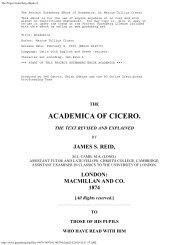From Farm House to the White House - 912 Freedom Library
From Farm House to the White House - 912 Freedom Library
From Farm House to the White House - 912 Freedom Library
Create successful ePaper yourself
Turn your PDF publications into a flip-book with our unique Google optimized e-Paper software.
<strong>Farm</strong> <strong>House</strong> <strong>to</strong> <strong>the</strong> <strong>White</strong> <strong>House</strong>, by William M. Thayer 29<br />
"Better than playing soldier?" said George inquiringly, and in a <strong>to</strong>ne of pleasantry. He had already organized<br />
<strong>the</strong> boys in Mr. William's school in<strong>to</strong> two armies, and more than one mimic battle had been fought.<br />
"Yes, better than any sham thing," answered Mr. Williams. "It will be study and diversion <strong>to</strong>ge<strong>the</strong>r--work and<br />
play--improving mind and body at <strong>the</strong> same time."<br />
"I see, I see," responded George. "I can abandon soldiering for that." But he never did. There was <strong>to</strong>o great<br />
fascination about military tactics <strong>to</strong> allow of that. He devoted himself <strong>to</strong> surveying with commendable<br />
application and rapid progress; but he continued, <strong>to</strong> some extent, <strong>the</strong> chief sport of his school-days--mimic<br />
war.<br />
George was not more than thirteen or fourteen years of age when he surveyed <strong>the</strong> land about <strong>the</strong> school-house.<br />
He was <strong>the</strong> first pupil in Mr. Williams' school who had performed such a practical piece of work, and his<br />
school-mates were deeply interested in his exploit. He ranked high as a scholar, and his manly bearing made<br />
him appear several years older than he was. He led Mr. Williams' school, as he did that of Mr. Hobby, in<br />
scholarship, behavior and physical prowess. He seemed born <strong>to</strong> lead, and his associates were content <strong>to</strong> have it<br />
so.<br />
One of his biographers speaks as follows of his first efforts at surveying:<br />
"When he had advanced so far in his study as <strong>to</strong> give him some idea of <strong>the</strong> proper use and handling of <strong>the</strong><br />
chain and compass, <strong>the</strong> two principal instruments employed in this art, he began <strong>to</strong> put his knowledge in<strong>to</strong><br />
practice by taking surveys of <strong>the</strong> farms lying in <strong>the</strong> immediate neighborhood of his school-house.<br />
"Assisted by his school-mates, he would follow up and measure off, with <strong>the</strong> help of his long steel chain, <strong>the</strong><br />
boundary lines between <strong>the</strong> farms, such as fences, roads, and water-courses; <strong>the</strong>n those dividing <strong>the</strong> different<br />
parts of <strong>the</strong> same farm; determining at <strong>the</strong> same time, with <strong>the</strong> help of his compass, <strong>the</strong>ir various courses, <strong>the</strong>ir<br />
crooks and windings, and <strong>the</strong> angles formed at <strong>the</strong>ir points of meeting or intersection. This would enable him<br />
<strong>to</strong> get at <strong>the</strong> shape and size not only of each farm, but of every meadow, field and wood composing it. This<br />
done, he would make a map or drawing on paper of <strong>the</strong> land surveyed, whereon would be clearly traced <strong>the</strong><br />
lines dividing <strong>the</strong> different parts with <strong>the</strong> name and number of acres of each attached, while on <strong>the</strong> opposite<br />
page he would write down <strong>the</strong> long and difficult tables of figures by which <strong>the</strong>se results had been reached. All<br />
this he would execute with as much neatness and accuracy as if it had been left with him <strong>to</strong> decide <strong>the</strong>reby<br />
some gravely disputed land-claim."<br />
Irving says of him as a surveyor: "In this he schooled himself thoroughly; making surveys about <strong>the</strong><br />
neighborhood, and keeping regular field-books, in which <strong>the</strong> boundaries and measurements of <strong>the</strong> fields<br />
surveyed were carefully entered, and diagrams made with a neatness and exactness, as if <strong>the</strong> whole related <strong>to</strong><br />
important land transactions instead of being mere school exercises. Thus, in his earliest days, <strong>the</strong>re was<br />
perseverance and completeness in all his undertakings. Nothing was left half done, or done in a hurried and<br />
slovenly manner. The habit of mind thus cultivated continued through life; so that however complicated his<br />
tasks and overwhelming his cares, in <strong>the</strong> arduous and hazardous situations in which he was often placed, he<br />
found time <strong>to</strong> do everything, and <strong>to</strong> do it well. He had acquired <strong>the</strong> magic of method, which of itself works<br />
wonders."<br />
One day a dispute arose between two pupils respecting a chapter of Virginia's early his<strong>to</strong>ry--Captain Smith<br />
and Pocahontas.<br />
"She saved his life," exclaimed one.<br />
"Very true; but she was not <strong>the</strong> daughter of King Opechancanough, as you say," replied <strong>the</strong> o<strong>the</strong>r.















